
# 3839 - 2004 37c Henry Mancini
2004 37¢ Henry Mancini
City: Los Angeles, CA
Quantity: 80,000,000
Birth Of Henry Mancini
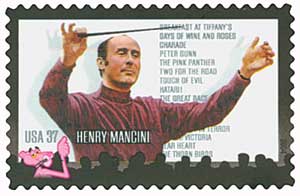
Enrico Nicola “Henry” Mancini was born on April 16, 1924, in the Little Italy neighborhood of Cleveland, Ohio.
Mancini spent much of his childhood in Pittsburgh, where his father got him piccolo lessons at the age of eight. By the time he was 12, Mancini learned to play piano and soon played in a band with his father called the Sons of Italy.
After graduating from high school, Mancini attended the prestigious Juilliard School of Music in New York City. However, after just a year in school, he was drafted into the Army. He served in the infantry before joining the Army band and aided in the liberation of the Mauthausen-Gusen concentration camp in Austria.
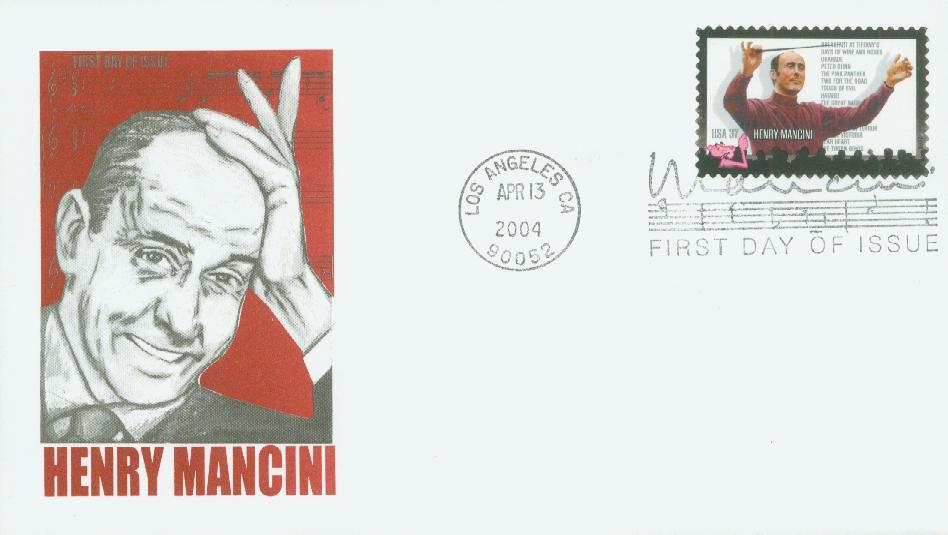
After being discharged from the Army, Mancini joined the Glenn Miller Orchestra as arranger and pianist. He also furthered his education by studying with some established composers. Then in 1952, Mancini was hired by the Universal Pictures music department. Over the course of six years, he provided music for more than 100 movies, including Creature from the Black Lagoon, The Creature Walks Among Us, It Came from Outer Space, Tarantula, This Island Earth, The Glenn Miller Story, The Benny Goodman Story, and Touch of Evil. He also wrote hit songs during this time, including “I Won’t Let You Out of My Heart.”
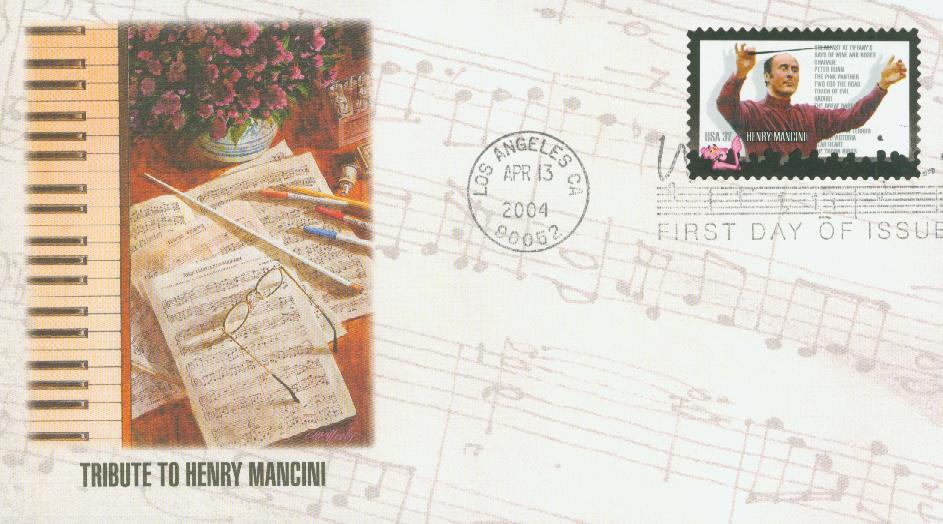
In 1958, Mancini embarked on a career as an independent composer and arranger. He provided the score for the TV show Peter Gunn and was a pioneer for his use of jazz music in films and TV shows. Mancini developed a close working relationship with Blake Edwards and provided the music for several notable projects including Breakfast at Tiffany’s, Days of Wine and Roses, The Pink Panther, The Great Race, The Party, and Victor Victoria. During this time he worked with several other notable filmmakers and provided music for Charade, Two for the Road, The Glass Menagerie, The Great Waldo Pepper, Silver Streak, and Frenzy.
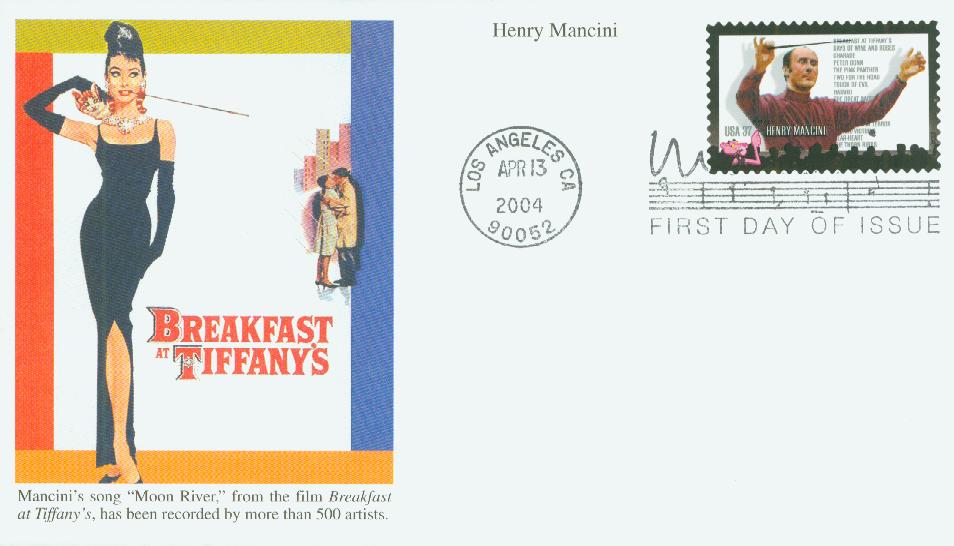
Between the 1960s and 1980s, many artists sang Mancini’s songs, including Paul Anka, Pat Boone, Frank Sinatra, Perry Como, Johnny Mathis, Jerry Vale, Tony Bennett, Wayne Newton, and many more. Mancini himself recorded more than 90 albums during his lifetime, eight of which were certified gold. And he conducted more than 50 concerts per year, totaling over 600 symphony performances during the course of his life.
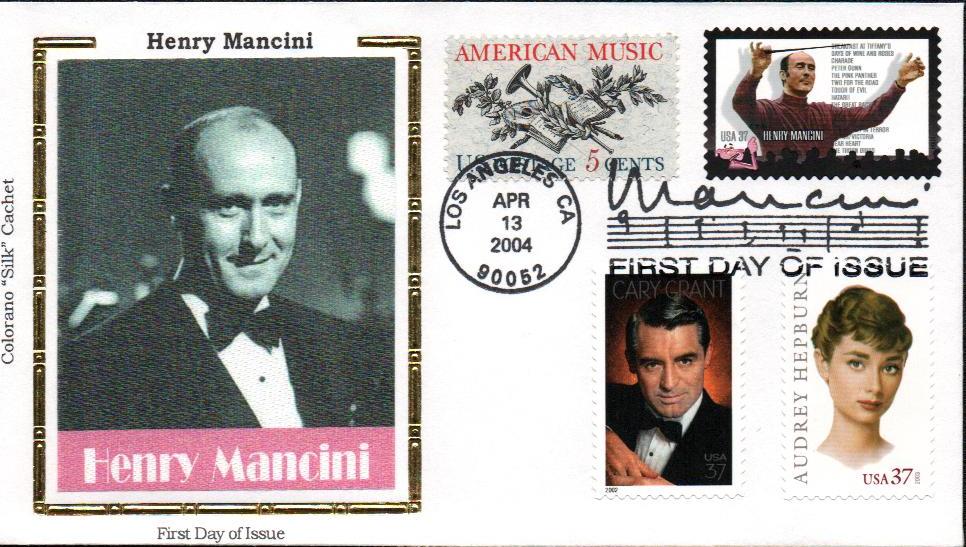
In his final years, Mancini was working on a Broadway stage version of Victor/Victoria. He was unable to finish it when he died on June 14, 1994. Mancini was the most successful film composer of his time. During his career, Mancini was honored with twenty Grammys, four Oscars, and a Golden Globe. In 1995, he was honored with a Lifetime Achievement Award.
2004 37¢ Henry Mancini
City: Los Angeles, CA
Quantity: 80,000,000
Birth Of Henry Mancini

Enrico Nicola “Henry” Mancini was born on April 16, 1924, in the Little Italy neighborhood of Cleveland, Ohio.
Mancini spent much of his childhood in Pittsburgh, where his father got him piccolo lessons at the age of eight. By the time he was 12, Mancini learned to play piano and soon played in a band with his father called the Sons of Italy.
After graduating from high school, Mancini attended the prestigious Juilliard School of Music in New York City. However, after just a year in school, he was drafted into the Army. He served in the infantry before joining the Army band and aided in the liberation of the Mauthausen-Gusen concentration camp in Austria.

After being discharged from the Army, Mancini joined the Glenn Miller Orchestra as arranger and pianist. He also furthered his education by studying with some established composers. Then in 1952, Mancini was hired by the Universal Pictures music department. Over the course of six years, he provided music for more than 100 movies, including Creature from the Black Lagoon, The Creature Walks Among Us, It Came from Outer Space, Tarantula, This Island Earth, The Glenn Miller Story, The Benny Goodman Story, and Touch of Evil. He also wrote hit songs during this time, including “I Won’t Let You Out of My Heart.”

In 1958, Mancini embarked on a career as an independent composer and arranger. He provided the score for the TV show Peter Gunn and was a pioneer for his use of jazz music in films and TV shows. Mancini developed a close working relationship with Blake Edwards and provided the music for several notable projects including Breakfast at Tiffany’s, Days of Wine and Roses, The Pink Panther, The Great Race, The Party, and Victor Victoria. During this time he worked with several other notable filmmakers and provided music for Charade, Two for the Road, The Glass Menagerie, The Great Waldo Pepper, Silver Streak, and Frenzy.

Between the 1960s and 1980s, many artists sang Mancini’s songs, including Paul Anka, Pat Boone, Frank Sinatra, Perry Como, Johnny Mathis, Jerry Vale, Tony Bennett, Wayne Newton, and many more. Mancini himself recorded more than 90 albums during his lifetime, eight of which were certified gold. And he conducted more than 50 concerts per year, totaling over 600 symphony performances during the course of his life.

In his final years, Mancini was working on a Broadway stage version of Victor/Victoria. He was unable to finish it when he died on June 14, 1994. Mancini was the most successful film composer of his time. During his career, Mancini was honored with twenty Grammys, four Oscars, and a Golden Globe. In 1995, he was honored with a Lifetime Achievement Award.













